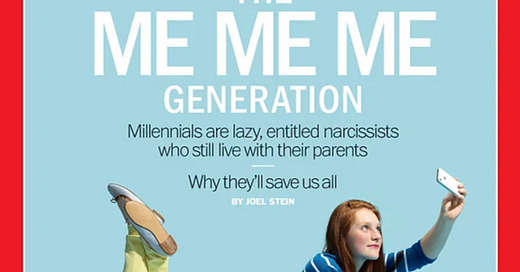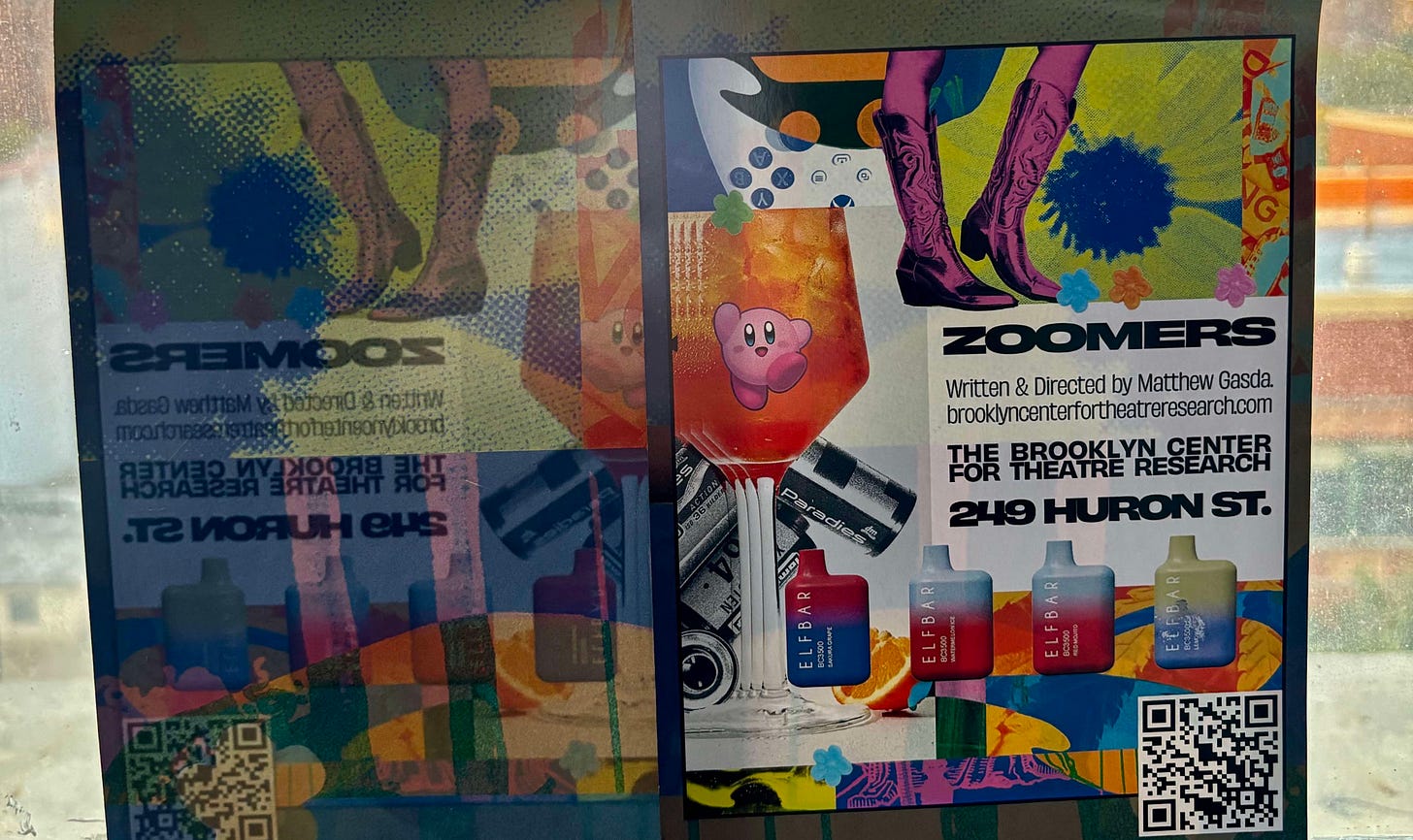My friend Trevor has a thing he often says, about how in today’s society, there are no elders, only olders. By that, he means there’s decreasing social worth placed on acquired skills and knowledge that comes with life experience—distinct from lived experience, which is something more of a status boost granted upon birth based on one’s identity. Therefore, as one ages, there is no upside, only downside. You just become a more out-of-touch, slower, paunchier, balder, and wrinklier version of a young person. There are no elders. Only old young people.
Millennials are guaranteed to age terribly. Not physically, since every month, there’s a new anti-aging cosmetic procedure. But cursed to be the first generation in a while to be less well-off than our parents, far fewer of us are going to be buying homes, having children, pumping up those retirement funds, and all those other hallmarks of moving on to the post-youth stage of life. Sooner rather than later, we’ll end up with the baggage of the worst aspects of the young and old. You can get away with being insufferable and delusional if you’re spry and beautiful, and you can get away with being judgy and stubborn if you’ve got a cool home and a grand life purpose that saves you from having to constantly scrounge for relevance in the latest discourse. But what happens if you’re just withering and going just as much as nowhere as you were fresh out of college?
But that also makes me wonder if that’s because we can’t or won’t move on. If the economic situation were as rosy as the 50s and 90s combined, how different would things be, really? There is a piece in the Cafe Hysteria Substack entitled “The Twenty-Something Teens” which looks at how 20-something women were eagerly identifying as teens (for instance, by overly identifying with the music of Olivia Rodrigo). My friends and I often talk about how the default identity that everyone tends to revert to online is that of the hysterical teen. Is that because online communication forces us to or because the freedom of the internet enables us to take our most preferred forms?
Onlineness has a tendency to expose what we truly value despite all our lofty ideals. That’s the dismaying thing about technology. We once dreamt that the supernova of free information would bring about a new universe of thriving independent media. But instead, we have NYT and WaPo expanding their empire while everybody else begs for scraps on Patreon or Substack. There is practically infinite knowledge to be learned to hone all sorts of skills, often for free. But social media culture has only deepened our need to be seen and paid attention to for our most superficial qualities. So in this environment, why shouldn’t the teenager be the most aspirational form? Nobody expects accountability and responsibility from you, but that’s now an asset and privilege.
This past Sunday, I went to a preview showing of a new play, Zoomers, by Matthew Gasda (best known for his play, Dimes Square) at the Brooklyn Center for Theater Research. The play revolves around a group of early 20-somethings and, mostly, their love lives. It’s a funny and emotionally generous show, mostly resisting any urge to ruthlessly flay Zoomers for their peccadilloes. So my wait for the Gen Z Lena Dunham continues. I highly recommend going to see it, especially since the BCTR is a very cool space and I really admire what they’re doing there with independent theatre.
One thing I kept thinking about as I watched the play was what the real, if any, differences between Millennials and Zoomers are, beyond the superficial differences like which attention-seeking apps we prefer and what slang we use. On one hand, the rate of technological advancements means that the generational experience gaps are likely to be significantly different between the two generations. Yet on the other hand, that very same technology allows such an ease in informational, even experiential, exchange that there’s nothing secretive or underground about a generation.
Is it optimism that’s the distinguishing factor between Millennials and Zoomers? The mindset I associate most with my generation is “do what you love.” When I was an adolescent, many of us truly had it ingrained into us that we deserved to make a living—no, a lucrative living—by fulfilling our passion. Anything else made you a failure, or worse, an extra in the background with no imagination. It comes off as deluded and narcissistic in retrospect, but there must’ve been some good that came out of such sunniness. In contrast, all but the eldest of Zoomers lost irreplaceable years of adolescence due to COVID. What they've gained in not being so annoyingly upbeat, they’ve lost in other things. Millennials are also the last generation to have enjoyed an offline childhood, where our worlds began at home and ended somewhere around that mall that was a 20-minute drive away. Meanwhile, a Zoomer friend of mine recently told me she’d first started using Tinder at 16.
Lately, I’ve thought about what the ideal birth year would’ve been for me. I’m not crazy about my own generational cohort, especially since the most unbearable Asian Americans tend to be around 35-45 because we came of age when being Asian was generally uncool except in certain aspects, and that imbalance caused all sorts of havoc among us. I’m happy the younger ones don’t have to go through that. But I also liked that offline childhood, like having my school be my entire universe and playing hockey in the streets instead of Valorant and not having porn on my phone before I even hit puberty. Zillennials are the best off among us then.
In 2021, there was a truly embarrassing (but also hilarious) piece from the New York Times with the headline “The 37-Year-Olds Are Afraid of the 23-Year-Olds Who Work for Them.” The piece began with a 30-something woman fretting that the emojis she used were now considered desperately uncool. Granted, the choice of interviewees for this article should be questioned (one of the Gen Z spokespeople was Ziad Ahmed, the guy who wrote “#BlackLivesMatter” a billion times for his college essay as if he were woke Jack Torrance). But it did get at a truth at that deep Millennial insecurity of aging and no longer being the newest hottest thing. If you’re a Millennial boss, why aren’t you enforcing your culture instead of obsequiously kowtowing to that of your underlings? We often ridicule Boomers for being unable to grow up, but at least they had something else to move on to. At this rate, Millennials look to be fighting for TikTok territory against Zoomers as every single one of us enters middle age. And then comes Gen Alpha.
Back to Zoomers, my favourite storyline was the one with Ella (played by Sophia Englesberg) and Mark (played by George Olensky), possibly because Mark is my age. Ella’s in her early 20s and Mark’s in his mid 30s, and while they have what seems to be a loving and mature relationship, the age gap issue makes them doubt each others’ intentions, not to mention their own. They’re in an open relationship too. Mark isn’t jealous of Ella’s other lovers, but she wants him to be. But he thinks it’s only right that she get to experience the freedom he had at her age. It’s not clear who’s getting the better end of this deal. But why does there even need to be a winner and loser in everything?
The whole age gap debate purports to be about power dynamics, but relationships never have equal power dynamics. One person is always going to be wealthier or smarter or more talented or more attractive or more sexually experienced or more mentally stable. Yet online society is obsessed with age gaps, which reveals its utmost coveting of youth. Online culture values youth above all else, and with age gap relationships, it dreads that the younger partner is squandering that priceless resource, at least in hetero relationships where the woman is the younger one. In the My Brilliant Friend Substack, in a piece entitled “September in Review,” even 21-year old women lament their youth slipping away. This isn’t entirely new as I remember my college female friends feeling this way towards the end of our college years. But this sentiment must undoubtedly be magnified these days.






It's strange, but I've found myself genuinely enjoying my life *more* as I age (nearing 30 in a few months), but that also coincides with moving off of the social media platforms over the last several years. Few of the people my age (who i see in person) show any fears of aging beyond what probably any generation in history has shown (because aging and dying is hard!), but the terminally online people are really struggling with it. They're still slipping into the trends, vocal patterns, and jokes of people far younger than them that they only interact with online, and there's something awfully sad about it. It's clear that they don't really belong to the trends of the generation that's younger than them, and they also don't fit in with themselves. It feels like a recipe for disaster and further alienation.
As atomization increases, generations are less rooted within their own cohorts. When you have less and less real friends, your idea of someone your own age becomes a narcissistic projection of your own personality. In the case of millennials, with their poor economic conditions and social media induced imposter syndrome feelings of inadequacy, this projection happens to be filled with a million different perceived flaws. Of course they don't care for people of their own age, they remind them of themselves.
When you can't be satisfied with your own friends, your own self, your only option left is to live vicariously through the youth. A mirror into the potential you've squandered. Fan fiction self inserts in reality.
This obsession with youth, juvemania, isn't just limited to socially damned millennials. Even for Genz, rolemodels of yesteryear, action stars and athletes, have been dethroned by younger and younger influencers. Your typical 14 year old doesn't aspire to be old man Robert Downy Junior -- they look half a centimeter up to some streamer that is barely a year older than them, if not the same age. As online media concentrates fame to younger and younger influencers, as the money flows from older cohorts trying to buy their respect, even the youngest will reach a tipping point. What happens when a Gen Z, with their adult life still far ahead of them, feels pathetic in the face of a Gen A starlet that has achieved everything they've ever dreamed of?
If the media and material conditions don't change for the better, the self esteem of Zoomers, Gen A, etc. will be in even more dire psychological straits. They won't even have a punching bag generation of geriatrics to blame all of their problems on. Maybe online notoriety should be relegated to vtubers, AI, etc. so future generations won't feel lousy in the face of impossible standards. They can finally admit to themselves that the standards have become inhuman and move on with their lives.